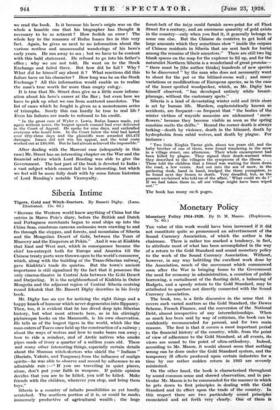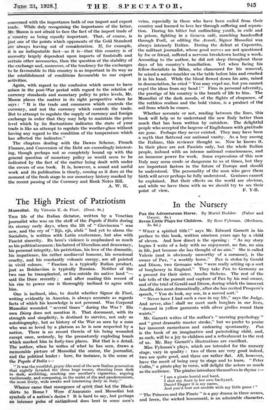Monetary Policy
Monetary Policy 1914-1928. By D. M. Mason. (Hopkinson. 7s. ed.) THE value of this work would have been increased if it did not constitute quite so pronounced an advertisement of the Sound Currency Association, of which the author is the chairman. There is rather too marked a tendency, in fact, to attribute most of what has been accomplished in the way of a return to the Gold Standard and sound monetary policy to the work of the Sound Currency Association. Without, however, in any way belittling the excellent work done by the Association, much of the movement which commenced soon after the War in bringing home to the Government the need for economy in administration, a cessation of public borrowing, a curtailment of the floating debt, a balancing of Budgets, and a speedy return to the Gold Standard, may be attributed to quarters not directly connected with the Sound Currency Association.
The book, too, is a little discursive in the sense that it covers such varied matters as the Gold Standard, the Dawes Scheme, French Finance, and the conversion of the National Debt, almost irrespective of any interrelationships. When so much has been said by way of criticism, the book can be confidently recommended for perusal, and for two main reasons. The first is that it covers a most important period in the financial history of the country, while, from the point of view of adherence to the Gold Standard, at all events, its views are sound to the point of ultra-orthodoxy. Indeed, according to Mr. Mason, it would almost seem that nothing wrong can be done under the Gold Standard system, and the temporary ill effects produced upon certain industries for a time by our rather sudden return in 1925 are severely minimized.
On the other hand, the book is characterized throughout by sound common sense and shrewd observation, and in par- ticular Mr. Mason is to be commended for the manner in which he gets down to first principles in dealing with the Gold Standard and its effect upon the trade of the country. In this respect there are two particularly sound principles enunciated and set forth very clearly. One of them is concerned with the importance both of our import and export trade. While duly recognizing the importance of the latter, Mr. Mason is not' afraid to face the fact of the import trade of a"country as being equally important. That, of course, is just one of the points which opponents of the Gold Standard are 'always leaving out of consideration'. If, for example, it is an indisputable fact as it is—that this country is of necessity largely dependent upon imports of foodstuffs and certain other necessaries, then the question of the stability of the exchange and, moreover, of the tendency for the exchanges to be favourable to this country is as important in its way as the establishment of conditions favourable to our export activities.
Again, with regard to the confusion which seems to have arisen in the post-War period with regard to the relation of currency standards and monetary policy to price levels, Mr. Mason places the matter in its right perspective when he says : " It is the trade and commerce which controls the currency, and not the currency which controls the trade. But to attempt to regulate the supply of currency and foreign exchange in order that they may help to maintain the price level which by its fluctuations indicates the state of your trade is like an attempt to regulate the weather-glass without having any regard to the condition of the temperature which has affected the indicator."
The chapters dealing with the Dawes Scheme, French Finance, and Conversion of the Debt are exceedingly interest- ing, though perhaps not so completely bound up with the general question of monetary policy as would seem to be indicated by the fact of the matter being dealt with under the covers of one book. It is, however, a sound and useful work and its publication is timely, coming as it does at the moment of the fresh stage in our monetary history marked by the recent passing of the Currency and Bank Notes Bill.
A. W. K.































 Previous page
Previous page